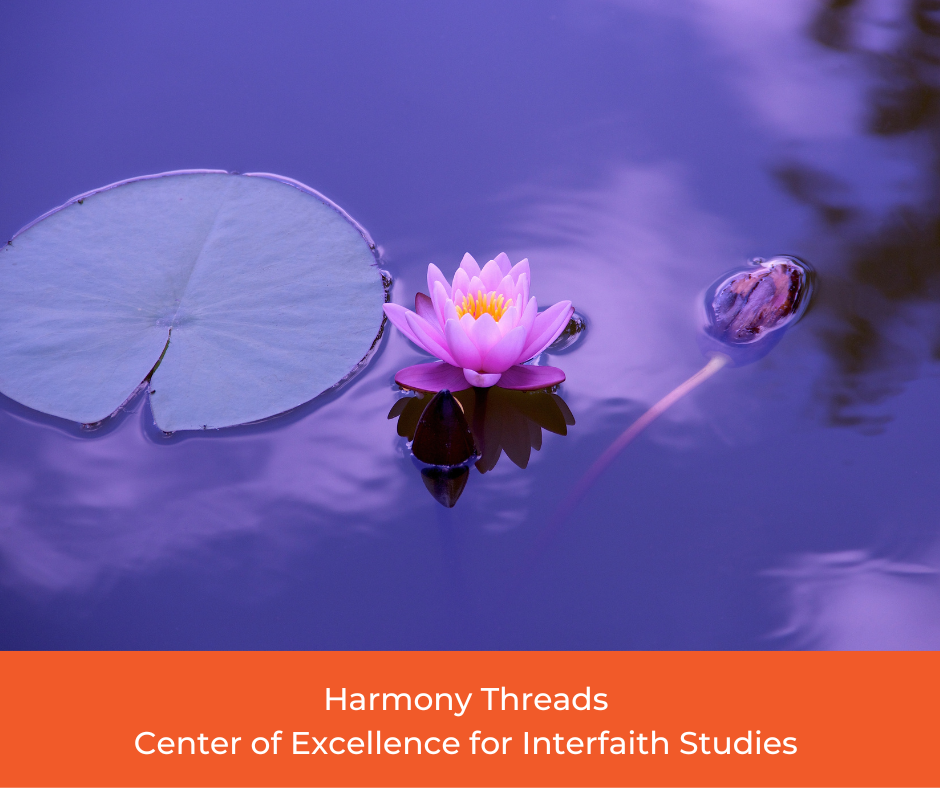Vision:
To create a world where individuals of all faiths unite in the spirit of mutual understanding, respect, and harmony, fostering a global community founded on interfaith dialogue and cooperation.
Objective:
The primary objective of the Harmony Threads Center of Excellence for Interfaith Studies is to facilitate the exploration and appreciation of religious diversity by focusing on six major world religions: Buddhism, Christianity, Hinduism, Islam, Judaism, and Sikhism.
Through education, dialogue, and cultural exchange, we aim to:
- Promote Interfaith Understanding: Encourage individuals from different faith backgrounds to engage in open and respectful conversations, promoting empathy and unity among diverse communities.
- Advance Interfaith Education: Offer comprehensive courses, workshops, and research opportunities to deepen knowledge of world religions, their historical contexts, and their contributions to global cultures.
- Celebrate Religious Diversity: Organize interfaith events, festivals, and cultural celebrations to showcase the richness of religious traditions and encourage participation and learning.
- Facilitate Interfaith Outreach: Collaborate with local faith communities, educational institutions, and organizations to create platforms for interfaith understanding and cooperation.
- Disseminate Interfaith Knowledge: Produce scholarly publications, articles, multimedia resources, and research findings to share insights and foster a culture of interfaith respect and harmony.
UNESCO SDG Alignment
Harmony Threads Center of Excellence for Interfaith Studies aligns with several United Nations Sustainable Development Goals (SDGs), demonstrating its commitment to fostering interfaith understanding, respect, and cooperation. Here’s how the center’s vision, objectives, and departments align with specific SDGs:




SDG 4: Quality Education
- The center’s primary objective includes advancing interfaith education by offering comprehensive courses and research opportunities in world religions. This contributes to SDG 4’s aim of ensuring inclusive and equitable quality education for all.
SDG 10: Reduced Inequality
- The center’s efforts to promote interfaith understanding and unity among individuals from different faith backgrounds align with SDG 10’s goal of reducing inequalities by fostering inclusivity and respect among diverse communities.
SDG 16: Peace, Justice, and Strong Institutions
- By encouraging interfaith dialogue and cooperation, the center contributes to SDG 16’s objective of promoting peaceful and inclusive societies and building strong, accountable institutions.
SDG 17: Partnerships for the Goals
- The center’s collaboration with local faith communities, educational institutions, and organizations reflects its commitment to fostering partnerships, which is a key element of SDG 17 aimed at achieving sustainable development.
Departments:
- Buddhism Studies: This department focuses on the teachings of Siddhartha Gautama, the historical development of Buddhist thought, and the diverse practices within Buddhism.
- Christianity Studies: Here, we delve into the life and teachings of Jesus Christ, the study of the Bible, and the exploration of the various branches of Christianity.
- Hinduism Studies: This department explores the multifaceted world of Hindu deities, sacred texts, rituals, and philosophies.
- Islam Studies: Understanding the core tenets of Islam, the Quran, the Hadith, and the cultural diversity of Muslim communities is the primary focus of this department.
- Judaism Studies: We uncover the history, traditions, and sacred texts of the Jewish faith, including an in-depth study of the Torah and Talmud.
- Sikhism Studies: With a special connection to our institution’s namesake, this department studies the life and teachings of Guru Nanak Dev Ji and the principles of Sikhism.
Through these departments, the Center of Excellence for Interfaith Studies aims to promote understanding, respect, and dialogue among followers of diverse faith traditions, ultimately contributing to the goal of a more harmonious and inclusive world.
